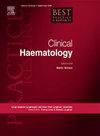急性髓性白血病的供体淋巴细胞输注
IF 2
4区 医学
Q3 HEMATOLOGY
引用次数: 0
摘要
供体淋巴细胞输注(DLI)是异基因造血细胞移植(allo-HCT)后复发性血液系统恶性肿瘤的一种重要治疗方式。供体T淋巴细胞可以以治疗性、先发制人或预防性的方式使用,试图刺激移植物抗白血病(GVL)效应,根除残留疾病,甚至在高风险环境中防止复发。DLI并非没有并发症,尤其是移植物抗宿主病(GVHD)。迄今为止的数据仅限于回顾性和小型前瞻性研究。这篇综述总结了关于复发管理方法、DLI的给药和时间、并发症和未来潜在治疗的现有文献。本文章由计算机程序翻译,如有差异,请以英文原文为准。
Donor lymphocyte infusion in Acute Myeloid Leukemia
Donor lymphocyte infusion (DLI) is an important treatment modality in the management of relapsed hematological malignancies after allogeneic hematopoietic cell transplantation (allo-HCT). Donor T lymphocytes can be used in a therapeutic, pre-emptive or prophylactic manner in an attempt to stimulate a graft versus leukemia (GVL) effect and eradicate residual disease or even prevent relapse in a high-risk setting. DLIs are not without complications, however, graft versus host disease (GVHD) in particular. Data to date is limited to retrospective and small prospective studies. This review summarizes the available literature on approaches to managing relapse, dosing and timing of DLI, complications and potential future therapies.
求助全文
通过发布文献求助,成功后即可免费获取论文全文。
去求助
来源期刊
CiteScore
4.20
自引率
0.00%
发文量
42
审稿时长
35 days
期刊介绍:
Best Practice & Research Clinical Haematology publishes review articles integrating the results from the latest original research articles into practical, evidence-based review articles. These articles seek to address the key clinical issues of diagnosis, treatment and patient management. Each issue follows a problem-orientated approach which focuses on the key questions to be addressed, clearly defining what is known and not known, covering the spectrum of clinical and laboratory haematological practice and research. Although most reviews are invited, the Editor welcomes suggestions from potential authors.

 求助内容:
求助内容: 应助结果提醒方式:
应助结果提醒方式:


